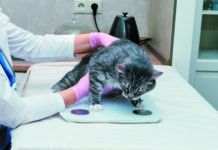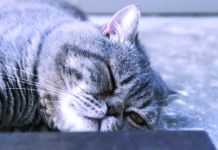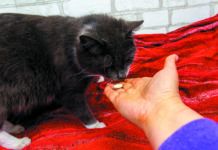Arthritis, nausea, chemotherapy side effects…these are just some of the types of pain cats experience that can be quelled with acupuncture treatment. One veterinarian we know even used it on a cat who was over-grooming herself to the point that she had hair loss. After a few acupuncture treatments, she started licking less, and her hair started growing back.
You might think being stuck with needles is the last thing your cat would tolerate. But many cats accept acupuncture treatments very well. That’s no doubt part of the reason that both the American Animal Hospital Association and the American Association of Feline Practitioners are on board. They state in jointly issued guidelines that “there is a solid and still growing body of evidence for the use of acupuncture for the treatment of pain in veterinary medicine to the extent that it is now an accepted treatment modality for painful animals.” Many pet health insurance companies will now cover acupuncture treatments, as well.
How it works
An appointment with a veterinarian trained in acupuncture might take anywhere from 30 to 60 minutes. (Some vets will come to your home to perform it.) Initially, the needles—as fine as hair—might stay in place for 10 minutes. Gradually, they will remain inserted for about 30 minutes. The doctor will insert the needles in spots believed to restore balance in the flow of energy where that balance has been disrupted, resulting in pain relief.
Consider that in Chinese medicine, the body has 12 meridians, or channels. Studies have found evidence that each of these channels has different electrical properties and may align with bands of collagen under the skin. When a veterinarian places an acupuncture needle into a channel, she is stimulating a response so that nerve impulses travel to the brain and then back down to tissues she wants to affect. It’s a way of “nudging blood flow and nerve impulses in specific directions,” says certified acupuncturist Karen Fine, DVM.
Some clients notice improvement in their cat in as little as 24 to 36 hours, with more substantial gains in comfort observed over the course of several sessions. They may also notice that their cat appears tired for a day or so after treatment. It’s because of the release of endorphins and other neurotransmitters that have an effect on the brain. Think of how you might feel after getting over a migraine. The headache is gone and you’re relieved for that, but you still feel the after effects.
Not for all cats
Acupuncture should not be used in the area of a tumor because the tumor could grow if stimulated. Additionally, acupuncture shouldn’t be used on pregnant cats because stimulation of certain points could trigger uterine contractions. There is also the very rare possibility of provoking seizures in a cat who is epileptic. Finally, acupuncture should not be used on a pet with a fever or an infection. It could spread the infection.
Then, too, while most cats are able to comply quite well with a veterinarian who is performing acupuncture on them (some even fall asleep during the procedure), there are pet felines that are just too stressed by human handling or unable to remain settled in a sitting or lying position.
Giving such cats a sedative to allow them to go through an acupuncture treatment is not a good idea. The whole point of acupuncture is to stimulate the nervous system. If you are depressing it with a drug, you are working against the therapy. It can prove counterproductive.
Of course, if your cat does accept acupuncture treatments, that doesn’t mean you can ditch Western medicine. Tai chi doesn’t replace Western pain modalities, including prescription drugs and other therapies. The two work in tandem.
Be prepared for the fact, too, that acupuncture doesn’t work for every animal. If you don’t see an improvement within two or three sessions, there’s a good chance you’re not going to. Not all pain relief treatments are for all pets.
Choosing a veterinarian with the proper credentials
Most veterinarians trained in acupuncture receive certification from either the International Veterinary Acupuncture Society (IVAS.org) or the Chi Institute (tcvm.org). Neither is equivalent to board certification by the American Veterinary Medical Association. But they require intensive course work and hands-on practice.




